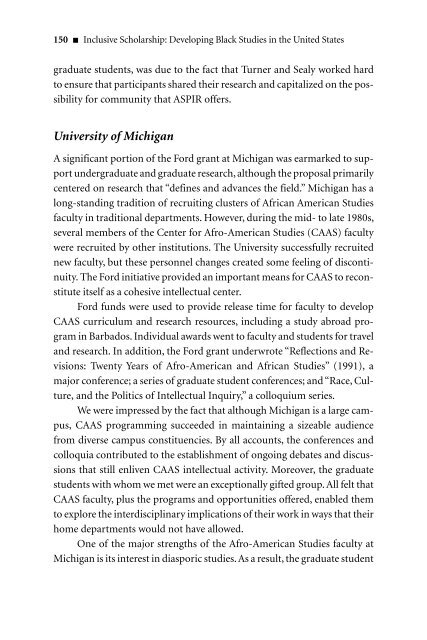Inclusive Scholarship: Developing Black Studies - Ford Foundation
Inclusive Scholarship: Developing Black Studies - Ford Foundation
Inclusive Scholarship: Developing Black Studies - Ford Foundation
Create successful ePaper yourself
Turn your PDF publications into a flip-book with our unique Google optimized e-Paper software.
150 <strong>Inclusive</strong> <strong>Scholarship</strong>: <strong>Developing</strong> <strong>Black</strong> <strong>Studies</strong> in the United States<br />
graduate students, was due to the fact that Turner and Sealy worked hard<br />
to ensure that participants shared their research and capitalized on the possibility<br />
for community that ASPIR offers.<br />
University of Michigan<br />
A significant portion of the <strong>Ford</strong> grant at Michigan was earmarked to support<br />
undergraduate and graduate research, although the proposal primarily<br />
centered on research that “defines and advances the field.” Michigan has a<br />
long-standing tradition of recruiting clusters of African American <strong>Studies</strong><br />
faculty in traditional departments. However, during the mid- to late 1980s,<br />
several members of the Center for Afro-American <strong>Studies</strong> (CAAS) faculty<br />
were recruited by other institutions. The University successfully recruited<br />
new faculty, but these personnel changes created some feeling of discontinuity.<br />
The <strong>Ford</strong> initiative provided an important means for CAAS to reconstitute<br />
itself as a cohesive intellectual center.<br />
<strong>Ford</strong> funds were used to provide release time for faculty to develop<br />
CAAS curriculum and research resources, including a study abroad program<br />
in Barbados. Individual awards went to faculty and students for travel<br />
and research. In addition, the <strong>Ford</strong> grant underwrote “Reflections and Revisions:<br />
Twenty Years of Afro-American and African <strong>Studies</strong>” (1991), a<br />
major conference; a series of graduate student conferences; and “Race, Culture,<br />
and the Politics of Intellectual Inquiry,” a colloquium series.<br />
We were impressed by the fact that although Michigan is a large campus,<br />
CAAS programming succeeded in maintaining a sizeable audience<br />
from diverse campus constituencies. By all accounts, the conferences and<br />
colloquia contributed to the establishment of ongoing debates and discussions<br />
that still enliven CAAS intellectual activity. Moreover, the graduate<br />
students with whom we met were an exceptionally gifted group. All felt that<br />
CAAS faculty, plus the programs and opportunities offered, enabled them<br />
to explore the interdisciplinary implications of their work in ways that their<br />
home departments would not have allowed.<br />
One of the major strengths of the Afro-American <strong>Studies</strong> faculty at<br />
Michigan is its interest in diasporic studies. As a result, the graduate student

















